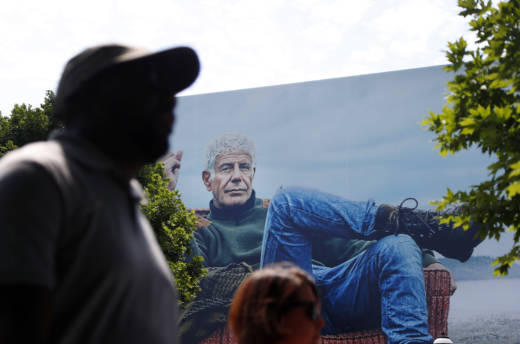"This is killer," Obama told Bourdain, as he dove in for more. Food writer Andrea Nguyen, whose cookbook on the Vietnamese national soup, Pho, also earned a James Beard award this year, tweeted after that memorable dinner, that the table at which the president and Bourdain dined "was encased like a museum piece at the restaurant." Bourdain, she said "did much for overlooked causes and cuisines, including that of Vietnam. RIP anh [brother] Tony."
Humanizing Muslims and Arabs ...
Bourdain saw food as not just sustenance — although sustenance was important — but as a way to convey a message of acceptance, respect, comfort. Parts Unknown got an award from MPAC (the Muslim Public Affairs Council) for its episode on Israel and Palestine. In his acceptance speech, made by video, Bourdain said, "The world has visited many terrible things on the Palestinian people, none more shameful than robbing them of their basic humanity."
Bourdain's death revealed another talent most of us knew nothing about. Laila El-Haddad, his co-author of The Gaza Kitchen: A Palestinian Culinary Journey, posted a photo on Twitter of Bourdain with her and her tiny daughter. "He was a master baby whisperer, and a master storyteller, having rocked my 7 month old to sleep in the middle of shooting our episode."
"Let's not forget that Anthony Bourdain was one of the few prominent media personalities who regularly humanized Muslims and Arabs as regular, everyday people-without politicizing their lives or stories," tweeted Khaled Beydoun, a law professor at the University of Detroit Mercy, and author of American Islamophobia.
As for Africa, Bourdain declared the continent, "one of the best arguments for travel I can think of," and lauded its ability to exist as a "functioning multicultural, multilingual, extraordinarily TOLERANT society ... It's someplace that everyone, given the chance, should go." (In that episode, he sits down with our own Ofeibea Quist-Arcton to share a snack in one of the city's bustling street markets.)
Supporting Women and Immigrants
Closer to home, Bourdain was an early supporter of #MeToo, noting he'd met several women who'd told him awful stories of abuse. In an interview with The Cut, Bourdain confessed he'd partially awakened to how widespread the issue of male predation was when his girlfriend, Asia Argento, confided she was one of disgraced film maker Harvey Weinstein's accusers.
"I stand unhesitatingly and unwaveringly with the women," he wrote on in a 2017 essay on Medium. And he meant not just in the film industry: "Right now, nothing else matters but women's stories of what it's like in the industry I have loved and celebrated for nearly 30 years..."
He also clapped back at the country's growing anti-immigrant, especially anti-Mexican, sentiment. On his blog in 2014, Bourdain noted that, "Americans love Mexican food ... Despite our ridiculously hypocritical attitudes towards immigration, we demand that Mexicans cook a large percentage of the food we eat, grow the ingredients we need to make that food, clean our houses, mow our lawns, wash our dishes, look after our children. As any chef will tell you, our entire service economy—the restaurant business as we know it—in most American cities, would collapse overnight without Mexican workers."
It's noticing things like that — and being unafraid to voice those observations in his books, blogs and on his television shows, that made Anthony Bourdain beloved, even revered, by the many communities of marginalized people that he visited, touched and supported.
Copyright 2018 NPR.
